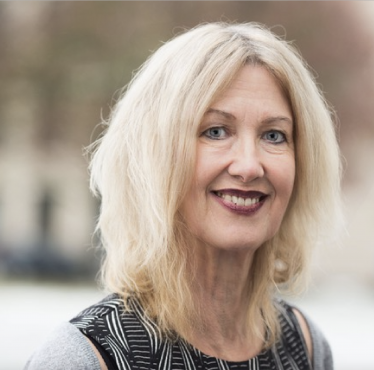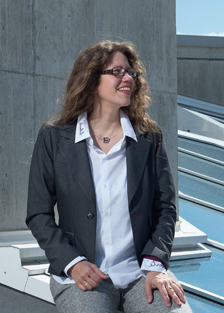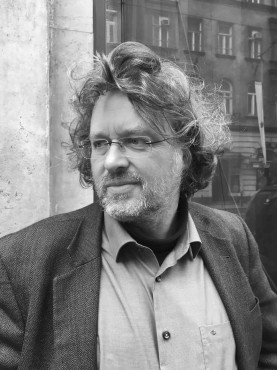 Doris Bachmann-Medick is Senior Research Fellow at the International Graduate Centre for the Study of Culture (GCSC) of the Justus Liebig University Giessen. She held numerous appointments as a Visiting Professor in Literary Studies and the Study of Culture, recently at the universities of Graz, Göttingen, UC Irvine, Cincinnati, and Georgetown University. During her time as fellow at the IFK in Vienna she completed her book on “Cultural Turns“. This cross-disciplinary work synthesizes not only the current theoretical trends and discussions in the humanities and social sciences, but also gives an insight into Doris Bachmann-Medick’s main research fields such as cultural theory, Kulturwissenschaften, literary anthropology (literature and ethnography), and cultural translation studies. She is especially interested in epistemological, cultural and political conditions of transcultural and global developments – in emerging concepts, topics , concerns and practices in cultural theory – and in cultures as manifold translations. In this regard she is currently co-editing a volume on „Futures of the Study of Culture“. She serves on the editorial board of Translation Studies.
Doris Bachmann-Medick is Senior Research Fellow at the International Graduate Centre for the Study of Culture (GCSC) of the Justus Liebig University Giessen. She held numerous appointments as a Visiting Professor in Literary Studies and the Study of Culture, recently at the universities of Graz, Göttingen, UC Irvine, Cincinnati, and Georgetown University. During her time as fellow at the IFK in Vienna she completed her book on “Cultural Turns“. This cross-disciplinary work synthesizes not only the current theoretical trends and discussions in the humanities and social sciences, but also gives an insight into Doris Bachmann-Medick’s main research fields such as cultural theory, Kulturwissenschaften, literary anthropology (literature and ethnography), and cultural translation studies. She is especially interested in epistemological, cultural and political conditions of transcultural and global developments – in emerging concepts, topics , concerns and practices in cultural theory – and in cultures as manifold translations. In this regard she is currently co-editing a volume on „Futures of the Study of Culture“. She serves on the editorial board of Translation Studies.
Recent Publications: Jenseits der Konsensgemeinschaft – Kulturwissenschaften im “socio-political turn?”, in: Zeitschrift für Kulturwissenschaften 2, 105-111, 2017. / Cultural Turns: New Orientations in the Study of Culture. Berlin/Boston: De Gruyter, 2016. / The Trans/National Study of Culture: A Translational Perspective. Berlin, Boston: de Gruyter, 2014. / more
Regarding the topic of the Summer School 2019, her areas of expertise include translation studies, cultural theory, interdisciplinary and transcultural developments in the study of culture, cross-cultural knowledge, travelling concepts, cultural turns.
__________________________________________________________________________________
 Monika Salzbrunn, Full Professor of Religions, Migration, Diasporas at University of Lausanne, invited research professor at Università degli Studi di Genova and associated researcher at CéSOR/EHESS Paris, is principal investigator of the European Research Council (ERC) project on ARTIVISM –Art and Activism. Creativity and performance as subversive means of political expression in super-diverse cities. She was leading the projects “(In)visible islam in the city. material and immaterial expressions of muslim practices within urban spaces in Switzerland” and “Undocumented Mobility and Digital-Cultural Resources after the ‘Arab Spring”, funded by the Swiss National Science Foundation. Monika Salzbrunn has published numerous articles and books in English, French, German, Italian, Portuguese and Japanese about political and religious performances in a context of migration and written several documentary films. She was visiting professor at the Japan Women’s University Tokyo and at Kwansei Gakuin University in Japan and is currently member of the research group POPADIVCIT, Popular Arts, Diversity and Cultural Policies in Post-Migration Urban Settings of the European Excellence Network IMISCOE, and associated researcher at CéSOR/EHESS Paris.
Monika Salzbrunn, Full Professor of Religions, Migration, Diasporas at University of Lausanne, invited research professor at Università degli Studi di Genova and associated researcher at CéSOR/EHESS Paris, is principal investigator of the European Research Council (ERC) project on ARTIVISM –Art and Activism. Creativity and performance as subversive means of political expression in super-diverse cities. She was leading the projects “(In)visible islam in the city. material and immaterial expressions of muslim practices within urban spaces in Switzerland” and “Undocumented Mobility and Digital-Cultural Resources after the ‘Arab Spring”, funded by the Swiss National Science Foundation. Monika Salzbrunn has published numerous articles and books in English, French, German, Italian, Portuguese and Japanese about political and religious performances in a context of migration and written several documentary films. She was visiting professor at the Japan Women’s University Tokyo and at Kwansei Gakuin University in Japan and is currently member of the research group POPADIVCIT, Popular Arts, Diversity and Cultural Policies in Post-Migration Urban Settings of the European Excellence Network IMISCOE, and associated researcher at CéSOR/EHESS Paris.
Recent publications: Civilisations, vol. 67, A l’écoute des transnationalisations religieuses/Sounding religious transnationalism, (in print). / Revue européenne des migrations internationales, vol. 35, 3-4, 2019: Musiques, danses et (trans)nationalismes, (in print) / L’événement (im)prévisible. Mobilisations politiques et dynamiques religieuses. Beauchesne, 2019. /L’islam (in)visible en ville. Appartenances et engagements dans l’espace urbain. Labor et Fides, 2019. / Migrations, circulations, mobilités. Nouveaux enjeux épistémologiques et conceptuels à l’épreuve du terrain. Sociétés Contemporaines, 2018.
Regarding the topic of the Summer School 2019, her areas of expertise include transnational social spaces, urban spaces, migration, political and religious practices, festive events/carnival/art/music/ theatre, visual anthropology, multisensory ethnography.
__________________________________________________________________________________
 Jens Schröter, Prof. Dr., is chair for media studies at the University of Bonn since 2015. He was Professor for Multimedial Systems at the University of Siegen 2008-2015. He was director of the graduate school “Locating Media” at the University of Siegen from 2008-2012. He is member of the DFG-graduate research center “Locating Media” at the University of Siegen since 2012. He was (together with Prof. Dr. Lorenz Engell, Weimar) director of the DFG-research project “TV Series as Reflection and Projection of Change” from 2010-2014. He was speaker of the research project (VW foundation; together with Dr. Stefan Meretz; Dr. Hanno Pahl and Dr. Manuel Scholz-Wäckerle) “Society after Money – A Dialogue”, 2016-2018. Since 4/2018 director (together with Anja Stöffler, Mainz) of the DFG-research project “Van Gogh TV. Critical Edition, Multimedia-documentation and analysis of their Estate” (3 years). Since 10/2018 speaker of the research project (VW foundation; together with Prof. Dr. Gabriele Gramelsberger; Dr. Stefan Meretz; Dr. Hanno Pahl and Dr. Manuel Scholz-Wäckerle) “Society after Money – A Simulation” (4 years). April/May 2014: „John von Neumann“-fellowship at the University of Szeged, Hungary. September 2014: Guest Professor, Guangdong University of Foreign Studies, Guangzhou, People’s Republic of China. Winter 2014/15: Senior-fellowship at the research group „Media Cultures of Computer Simulation“, Summer 2017: Senior-fellowship IFK Vienna, Austria. Winter 2018: Senior-fellowship IKKM Weimar.
Jens Schröter, Prof. Dr., is chair for media studies at the University of Bonn since 2015. He was Professor for Multimedial Systems at the University of Siegen 2008-2015. He was director of the graduate school “Locating Media” at the University of Siegen from 2008-2012. He is member of the DFG-graduate research center “Locating Media” at the University of Siegen since 2012. He was (together with Prof. Dr. Lorenz Engell, Weimar) director of the DFG-research project “TV Series as Reflection and Projection of Change” from 2010-2014. He was speaker of the research project (VW foundation; together with Dr. Stefan Meretz; Dr. Hanno Pahl and Dr. Manuel Scholz-Wäckerle) “Society after Money – A Dialogue”, 2016-2018. Since 4/2018 director (together with Anja Stöffler, Mainz) of the DFG-research project “Van Gogh TV. Critical Edition, Multimedia-documentation and analysis of their Estate” (3 years). Since 10/2018 speaker of the research project (VW foundation; together with Prof. Dr. Gabriele Gramelsberger; Dr. Stefan Meretz; Dr. Hanno Pahl and Dr. Manuel Scholz-Wäckerle) “Society after Money – A Simulation” (4 years). April/May 2014: „John von Neumann“-fellowship at the University of Szeged, Hungary. September 2014: Guest Professor, Guangdong University of Foreign Studies, Guangzhou, People’s Republic of China. Winter 2014/15: Senior-fellowship at the research group „Media Cultures of Computer Simulation“, Summer 2017: Senior-fellowship IFK Vienna, Austria. Winter 2018: Senior-fellowship IKKM Weimar.
Recent publications: Postmonetär denken, Wiesbaden: Springer 2018. (together with „Project Society after Money“) / Society after Money. A Dialogue, London/New York: Bloomsbury 2019. (together with „Project Society after Money“) /Markets, Minneapolis/London: University of Minnesota Press and Lüneburg: Meson (Series: In Search of Media). (together with Armin Beverungen, Philip Mirowski, Edward Nik-Khah).
Regarding the topic of the Summer School 2019, his areas of expertise include theory and history of digital media/digital culture, intermediality, virtual reality, multimedia, auditoryculture, visuality, media and capital.

